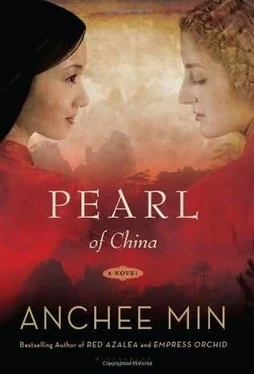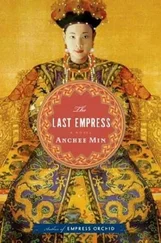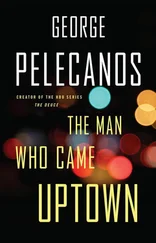I was ordered to pack immediately and move north. Rouge was excited. The fifteen-year-old had never stepped outside of Yenan. She had joined the Communist Youth League the previous year and had been working as a frontier journalist for the Yenan Daily. Several times Rouge had received awards as an Outstanding Comrade and had been given a Mao Medal. Her favorite songs were Soviet anthems and she favored a Lenin jacket.
We were to meet Dick in Peking. Mao had decided to make the city his new capital, and he had its name changed from Peking to Beijing. Also seeing a change were troops from the Eighth and Fourth Army Divisions. Previously under the command of Chiang Kai-shek, they now fell behind Mao and were incorporated into the People’s Liberation Army.
Dick drove an American jeep to pick us up. Although he was dark brown and thin from the stomach ulcers he had developed, he was happy. He told us that the car’s former owner had been Madame Chiang Kai-shek.
The People’s Liberation Army was received joyously by the city residents. Dick’s American jeep was part of the parade when we entered Beijing. The cheering crowd beat drums. Children threw flowers. “Long live Chairman Mao!” they shouted. “Long live the Communist Party of China!”
October 1, 1949, was the day of celebration for the nation. Standing on top of the Gate of Tiananmen, Mao proclaimed China’s independence to the world. He promised freedom and human rights. From that moment on, Mao was regarded as the wisest ruler heaven had ever bestowed on China. Few knew that it was Dick who had negotiated the peaceful transition.
Dick had been secretly working with General Chu, who had guarded Peking for Chiang Kai-shek. Dick had talked General Chu into surrendering. He convinced the man that Chiang Kai-shek had abandoned him. In Dick’s view, further fighting would mean a bloodbath from which Chu would emerge the loser no matter how hard he fought. In Mao’s name, Dick promised General Chu a high-ranking position in the People’s Liberation Army. Dick signed his name on this secret agreement for Mao. The moment General Chu raised the white flag, he would be called the People’s Hero.
I couldn’t believe my eyes when Dick took us to see our new home. It was inside the Forbidden City. We were to occupy one of the palaces. Dick told me that Mao and his wife, along with his vice chairman, his ministers, and their families, had already moved into the Forbidden City.
It took me days to convince myself that my life had really changed. At last, I didn’t have to live in a cave. I no longer had to endure air raids. Food would never again be a problem. I looked at myself in the mirror and saw a face I hardly recognized as my own. At age fifty-nine, I was finally able to settle down.
Instead of calling the palaces by their former Imperial names, the Communist housing authority gave them numbers. Our residence used to be called the Palace of Tranquillity; now it was called Building number 19.
I walked around my new home admiring the splendor of the Imperial architecture. The palace was a living work of art. Like a true beauty, she changed her face according to the light. Tremendous arching beams and brick columns reminded me of opera stage sets. Rouge was impressed by the huge wooden gate. She ran from room to room cheering and singing. We had four spacious main rooms and seven utility rooms. There was a roofed hallway to the garden withevergreen trees, luxurious bushes, and wonderfully scented flowers.
“How can we afford to live here?” I asked.
Dick smiled. “It’s free.”
“What do you mean free?”
“I didn’t choose this place,” Dick said. “It was Chairman Mao’s decision.” Looking at my expression, Dick explained, “It’s for Mao’s convenience. He wants me to be near for the sake of business.” He paused, looking at me attentively. “I thought this arrangement would make you happy. How many people in China get to live in a palace like this?”
I would have chosen a place where we could be private. I understood that Dick had no choice. Rouge was to join other children of high-ranking officials attending a private school where she would be taught more Russian than Chinese. The school’s goal was to prepare its graduates for the University of Moscow.
I felt a growing distance from my daughter after she started school. She no longer wanted to pray with me. She threw away the little picture of Jesus I kept in my bathroom. She told me that she had been selected captain of her class. Instead of a hug and a good-bye in the morning, she would raise her right hand to her temple and say, “Salute, comrades!” One day I found a portrait of Mao in my bedroom, replacing my favorite lotus painting. When I protested, Rouge said, “It is for your own good, Mother. You don’t seem to understand what is going on outside our family.”
I was not used to my new role as a revolutionary’s housewife. For security reasons, I was not allowed to share my address with anyone, including Papa. I complained to Dick and said that I missed my father. A month later, Papa was dropped at my door like a package. Although robust in health and glad to see me, Papa described his journey as being “kidnapped.” Mao’s secret agents plucked him from Chin-kiang and brought him to Beijing. Papa was not told where he was going or whom he was going to see. During his stay in the Forbidden City, Papa was reprimanded for trying to exit the gates without permission. He fought with the guards and said that he didn’t want to be a prisoner. Finally Papa begged me to buy him a ticket so that he could return to Chin-kiang. I bought him a ticket and was sad when he didn’t turn his head as he boarded the train. We barely had time to talk and catch up about our lives. I didn’t even get a chance to ask Papa how everyone was doing in Chin-kiang.
I tried to find a way to let Pearl know about my move to Beijing. I assumed that she would know about Mao’s victory. I wondered what she thought about Chiang Kai-shek’s defeat. In a way, Pearl had predicted the outcome during our earlier correspondences. So many had been impressed by Madame Chiang Kai-shek, who had campaigned in America for her husband and succeeded in rallying the public behind her. But Pearl did not believe her claims. Pearl had often said in the past that the Chiangs were in power for themselves. She believed that there was a divide between the Chiangs and the peasants of China. She had said long ago that Mao’s power came from his understanding of the peasants.
Pearl never trusted the Communists. She enjoyed her friendship with Dick and supported my marriage to him because she saw that he loved me. On the other hand, Pearl didn’t like my being brainwashed by Dick. When I mentioned Dick’s worship of Karl Marx in a letter, Pearl wrote back and asked, “Do you know who Karl Marx is? He is this strange little man, long dead, who lived his narrow little life, and somehow managed by the power of his wayward brain to lay hold upon millions of human lives!”
This made sense to me, although nothing I said changed Dick’s mind. With Mao’s victory, Dick had gone further on what I would call a journey of no return.
A party commemorating national independence was next on Mao’s agenda. Dick was put in charge of arranging it. He was grateful that Mao trusted him with the job. He was finally doing what he loved-bringing talented people together. I rarely got to see Dick in daylight. I told myself that I was lucky my husband had not died in battle, and that I should be satisfied our lives were taken care of by the Communist Party. We were given chefs, drivers, doctors, dressmakers, bodyguards, and house cleaners.
I wrote to Pearl the first chance I got. Beijing was a huge city where I could easily melt into the crowd when visiting a post office. I told Pearl that while Dick became an ever more devoted Communist, I remained an independent bourgeois liberal, and worse, I continued to be a Christian. “The changing China excites me and scares me at the same time,” I confessed. “Mao has made himself into a god to the people. I feel like I am losing my husband and daughter to this man. The irony is: I am the person they think mad.”
Читать дальше












